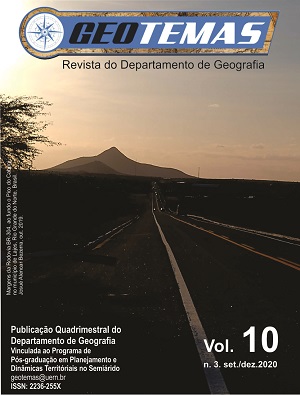Sustainable Cities and environmental: a history from the perception of Municipal Managers of the Metropolitan Region of Cariri, Ceará, Brazil
Keywords:
Sustainability, Metropolization, Municipal Management, Urban planning, EnvironmentAbstract
The Metropolitan Region of Cariri (RM Cariri) is located in the extreme south of the state of Ceará and currently consists of nine municipalities. The region has a context of high economic and demographic growth, especially in the main municipalities that comprise it. The objective of this research is to analyze the sustainability bias in the RM Cariri from the perception of municipal managers and the legal-institutional apparatus of interaction between urban and environmental issues. The perception of the notion of sustainable cities by the mayors of the municipalities that are members of RM Cariri was obtained through interviews with subsequent analysis of the discourse, while the legal-institutional apparatus was obtained through secondary data. RM Cariri presents few measures and actions that can be classified as sustainable and, therefore, are related to the dimensions and characteristics of Sustainable Cities. Not even simple questions like the elaboration of the Participative Master Plan are unanimous in this arrangement. Regarding the perception of municipal mayors about knowledge about the notion of sustainable cities, it was noted that, often, the view of these actors was limited to one of the dimensions of sustainability - generally, the economic one. Thus, there is a distorted and limited view of what sustainability is, aligning it only with the economic bias, and, therefore, this also had an impact on the notion of sustainable cities. Therefore, there is an inclination to produce an environment with good economic rates, but with an unsustainable social and environmental situation that will bring more evident losses to future generations.
Downloads
References
BRAGA, T. M.; et al. índices de sustentabilidade municipal: o desafio de mensurar. Belo Horizonte: UFMG/Cedeplar, 2003. 22p. (Texto para discussão; 225).
BREMER, U. F. Por nossas cidades sustentáveis. In: 5º Congresso Nacional dos Profissionais e 61ª Semana Oficial da Engenharia, da Arquitetura e da Agronomia, 2004, São Luís - MA. 61ª SOEAA/5º CNP Exercício Profissional e Cidades Sustentáveis: Textos Referenciais. Brasília, DF: CONFEA, 2004. p. 143-145.
CAREGNATO, R. C. A. C.; MUTTI, R. Pesquisa qualitativa: análise de discurso versus análise de conteúdo. Texto Contexto Enferm, Florianópolis, 2006 Out-Dez; 15(4): 67984.
CONSELHO NACIONAL DE DESENVOLVIMENTO CIENTíFICO E TECNOLÓGICO (CNPQa). Prêmio Jovem Cientista - Cidades Sustentáveis: Caderno do Professor, 25. Brasília: CNPq, 2011. Disponível em: <http://50.19.81.140/images/stories/WEBPROFESSOR-INTRO.pdf>. Acesso em: 10 dez. 2019.
CONSELHO NACIONAL DE DESENVOLVIMENTO CIENTíFICO E TECNOLÓGICO (CNPQb). XXV Prêmio Jovem Cientista – Cidades Sustentáveis: Ambientes Sustentáveis - Casa, Escola, Trabalho, Espaços Públicos, 25. Disponível em: <http://50.19.81.140/images/stories/WEB-PROFESSOR-CAP1.pdf>. Acesso em: 10 dez. 2019.
GIL, A. C. Como Elaborar Projetos de Pesquisa. 5. Ed. São Paulo: Atlas, 2010.
GIRARDET, H. Creating Sustainable Cities. Bristol: Green Books, 2007.
GOMES, R. C. S. P. P. Cidades Sustentáveis: O contexto europeu. Universidade Nova Lisboa: Dissertação de Mestrado apresentada a Faculdade de Ciências e Engenharia do Ambiente, 2009.
IBGE - INSTITUTO BRASILEIRO DE GEOGRAFIA E ESTATíSTICA. Censo Demográfico 2010. Disponível em: <http://www.ibge.gov.br>. Acesso em: 22 mar. 2020.
IBGE - INSTITUTO BRASILEIRO DE GEOGRAFIA E ESTATíSTICA. Pesquisa de Informações Básicas Municipais – MUNIC. 2018. Disponível em: <https://www.ibge.gov.br/estatisticas/sociais/saude/10586-pesquisa-de-informacoesbasicas-municipais.html?=&t=o-que-e>. Acesso em: 10 abr. 2020.
IBGE - INSTITUTO BRASILEIRO DE GEOGRAFIA E ESTATíSTICA. Estimativas da população residente para os Municípios e para as Unidades da Federação brasileiros com data de referência em 1º de julho de 2020. Disponível em: <https://ww2.ibge.gov.br>. Acesso em: 20 out. 2020.
LOW, N.; GLEESON, B. et all (ed.). Consuming Cities: The Urban Environment in the Global Economy after the Rio Declaration. London: Routledge, 2000.
MAINGUENEAU, D. A análise do discurso e suas fronteiras. Matraga, rio de janeiro, v.14, n.20, p.13-p.37, jan./jun. 2007.
MARCONI, M. A.; LAKATOS, E. M. Técnicas de Pesquisa: Planejamento e execução de pesquisas, elaboração, análise e interpretação de dados. 6 ed. São Paulo: Atlas, 2006.
MARICATO, E. A Cidade Sustentável. In: 9º Congresso Nacional de Sindicatos de Engenheiros – CONSENGE. 2012.
MINISTÉRIO DO MEIO AMBIENTE. Cidades Sustentáveis: subsídios í elaboração da Agenda 21 brasileira. Brasília: Ministério do Meio Ambiente; Instituto Brasileiro de Meio Ambiente e dos Recursos Naturais Renováveis; Consórcio Parceria 21 IBAM-ISERREDEH, 2000.
Nascimento, D. C. do. Ser-Tão "metropolitano": espacialidade e institucionalidade na Região Metropolitana do Cariri. Tese (doutorado) - Universidade Federal de Pernambuco, CFCH. Programa de Pós-graduação em Geografia, Recife, 2018.
SEVERINO, A. J. Metodologia do Trabalho Científico. 23 ed. rev. e atual. São Paulo: Cortez, 2007. WORLD COMMISSION ON ENVIRONMENT AND DEVELOPMENT – WCED. Our Common Future. Brundtland Report, Berna: WCED, 1987.
Downloads
Published
How to Cite
Issue
Section
License
Authors who submit their manuscripts to Geotemas declare that the work is an original article and has not been submitted for publication, in full or in part, in another national or international scientific journal or in another circulation vehicle. The authors also declare that they agree with the transfer of the copyright of the referred article to the magazine Geotemas (University of the State of Rio Grande do Norte), allowing for later publications, as long as the source of its publication is assured. Finally, they assume public responsibility for the article, being aware that any charges arising from a claim by third parties regarding the authorship of the work may apply to them.



















